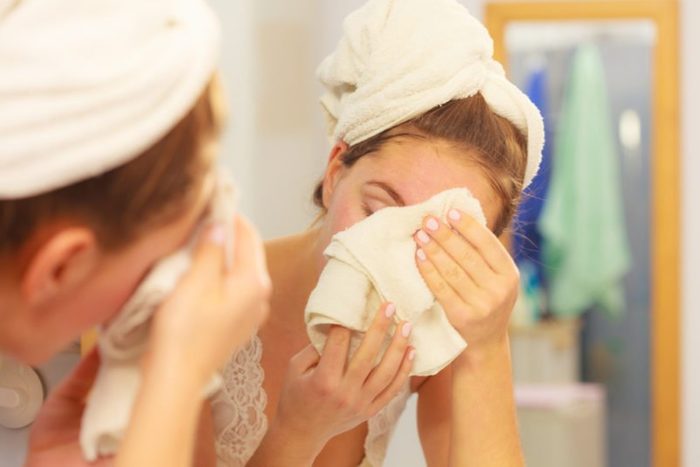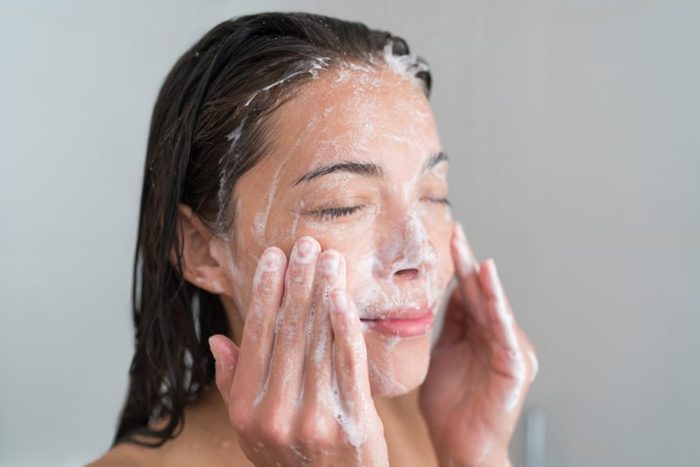
Face washing mistakes to avoid
Washing your face is pretty straightforward, right? You wet your face with water, apply a dime-sized amount of facial cleanser, and gently use your fingertips to wash away dirt and other impurities. However, make some simple errors and this part of your daily skincare routine could trigger skin issues like skin irritation, especially if you have sensitive skin. To improve your face washing habits, dermatologists identify common cleansing mistakes and tips for better skin health.
(Related: Here’s how to give yourself a spa-worthy at-home facial.)
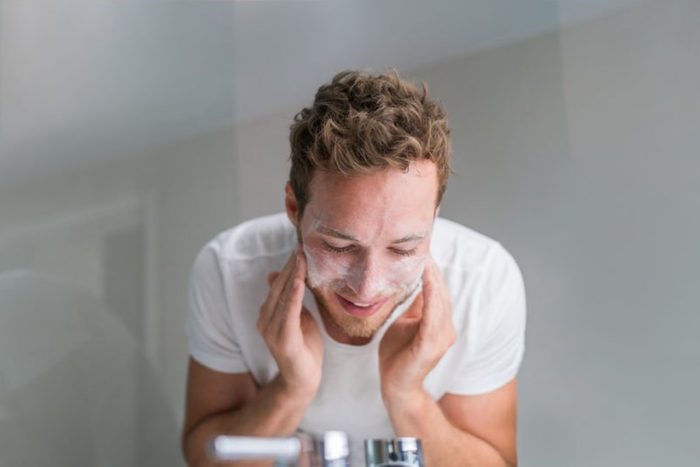
You use the wrong water temperature
Water that’s too hot will dry your skin, while cold water won’t let your pores open, says New York-based cosmetic dermatologist Michele Green, MD. “Tepid water is the best water temperature,” Dr. Green says. “Not too hot and not too cold.”
(Related: Check out the worst skin-care advice dermatologists have heard.)

You wash too often
People with dry skin might only need to cleanse once a day, and even those with more oily skin should wash twice a day at max. Any more than that could dry out your skin, making it produce even more oil to compensate, says Mona Gohara, MD, associate clinical professor at Yale’s department of dermatology. If you do wash just once, make it at night rather than in the morning. “You wash off the day’s grime and pollutants that accumulate during the day,” she says. “Not only does sun cause aging, but pollutants do as well.”
(Related: Learn all about niacinamide, a currently trendy skin-care ingredient.)
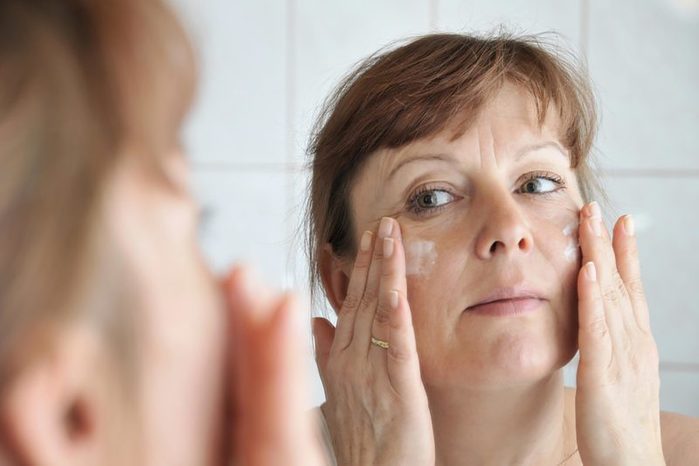
You exfoliate too often
An exfoliating cleanser or device can slough away dead skin cells and leave the skin glowing. But daily exfoliation can lead to dryness and flakiness, says Ivy Lee, MD, a dermatologist based in Pasadena, California. “That squeaky clean feeling will lead to irritation,” she says. Limit exfoliation to just once a week.
(Related: Here’s what else you need to know about exfoliating your face.)
You use a dirty washcloth
Using a clean, soft washcloth is effective for cleaning your face, but unless you use a new one every day, you should probably stick with using your hands to scrub, Dr. Green says. Also, ideally, you should change the towel you use to dry your face every couple of days to keep bacteria at bay, adds Dr. Gohara. “That’s hard for a lot of people, but it’s important to switch it out,” she says. “Moistness can accumulate bacteria.”
(Related: Here are the personal care items you never knew you needed.)
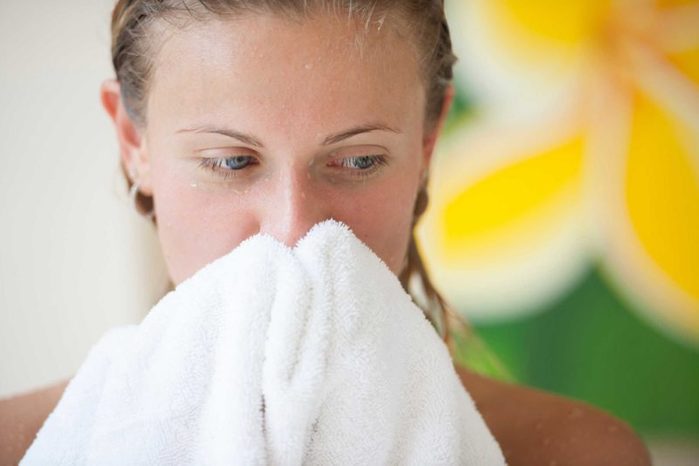
Your washcloth isn’t soft enough
A soft washcloth can be a good way to apply cleanser, but an overly abrasive one will be tough on your skin, Dr. Lee says. “Anywhere you can feel the fibers is too rough,” she says.
(Related: Here are other everyday habits drying out your skin.)

You use facial wipes
Face wipes are better than nothing in a pinch, but you shouldn’t rely on them for your normal face-wash routine, Dr. Green says. “They don’t clean the skin and they have chemicals,” she says. Stash some wipes in your gym bag, but give your face a full wash with cleanser and water when you can.
(Speaking of chemicals, learn about the ingredients that are causing you to break out.)
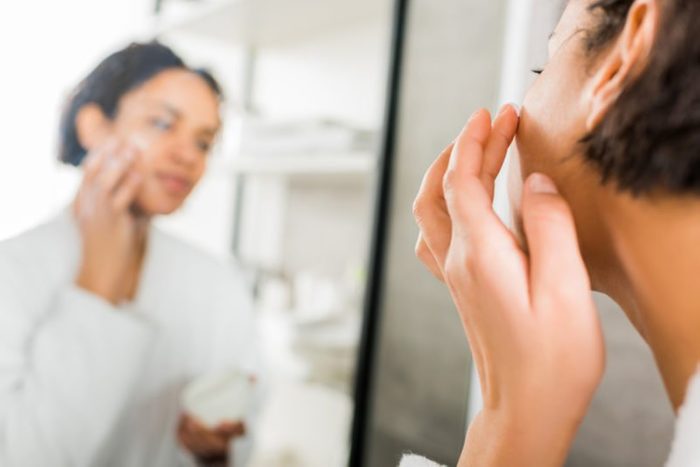
You use the wrong products
Foaming washes work well for oily skin, while a more hydrating cleanser is better for dry skin, Dr. Gohara says. Those with oily skin can benefit from alpha-hydroxy acids or salicylic acids, but those ingredients can be too harsh on people without oily skin, Dr. Green says. “If you have delicate skin, you don’t want something irritating. If you’re acne-prone, a mild wash will only work if you use an astringent later,” she says. “They’re not bad products, they’re just for the wrong kind of skin.”
(Related: Popular French beauty items you can find in Canadian drugstores.)

You use a soap-based product
Never substitute a soap-based product for a non-soap cleanser. “Soap-based products strip the skin of natural oils and leave skin irritated, dry, and more likely to be inflamed,” Dr. Gohara says. “Non-soap cleansers hydrate the skin and replenish the skin barrier, so the skin is much more healthy.” You don’t have to nix any bar cleanser—Dove, for instance, is a non-soap cleanser—but read the label before using a product that looks like soap.
(Here are a few natural face cleansers you can make yourself.)

You rub in your cleanser wrong
For the most effective wash, rub in your cleanser using circles that go outward to stimulate blood flow and encourage your lymph to carry waste from the tissues. “It’s like a little massage,” Dr. Gohara says. “Increasing blood flow plumps up skin and primes it to sit in an upward position instead of sagging.”
(Related: Learn about how a gua sha tool can also give your face a massage.)
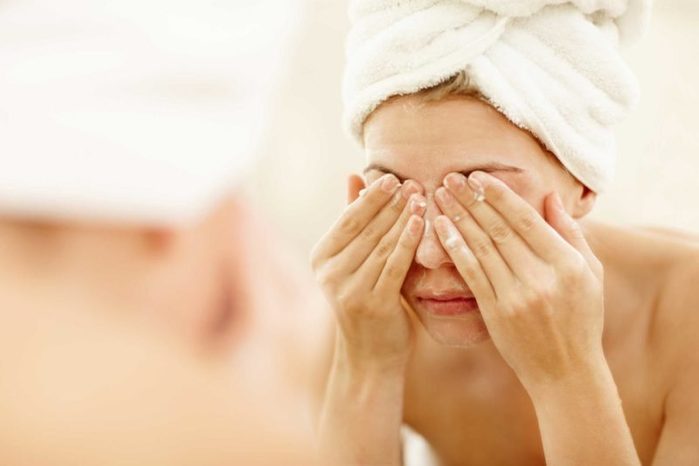
You rub too vigorously
You don’t need to scrub aggressively to get rid of impurities on your skin. Gently rubbing your cleanser in will do the trick without being too rough on your skin. “You don’t want to scrub it off—that’s a myth,” Dr. Green says. “With the right cleanser, you shouldn’t have to scrub hard.”
(Here are some anti-aging tips dermatologists won’t tell you for free.)

You rub your face dry
Rubbing a towel against your face will remove the lipids, proteins, and fatty acids that protect your skin from irritation, Dr. Gohara says. “It’s better to pat [your face] dry to keep that barrier intact,” she says.
(Related: Here are the best face mist sprays that can hydrate skin.)
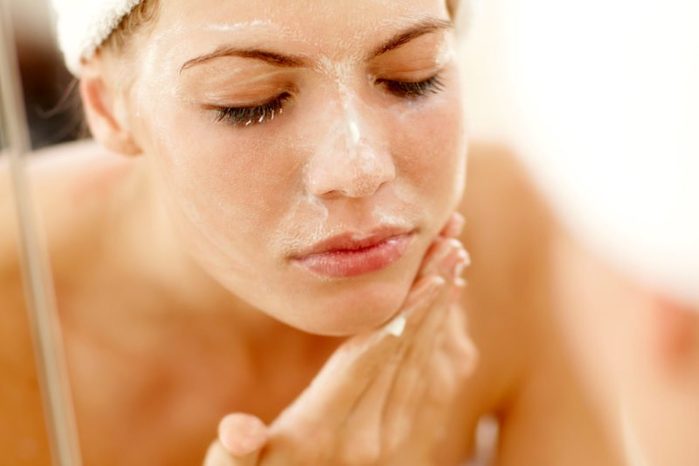
You wait to moisturize
The best time to apply creams and serums is right after you’re done washing your face, so don’t wait to put them on. “Your face is the cleanest it’ll be, and you’re locking in the hydration from the water,” Dr. Gohara says. The exception? Acne products. “Acne medications can be irritating when applied on wet skin,” Lee says. “Wait until it’s dry because you don’t want to absorb as much of the acne medication right away.”
(Here are the best face moisturizers, according to your skin type.)
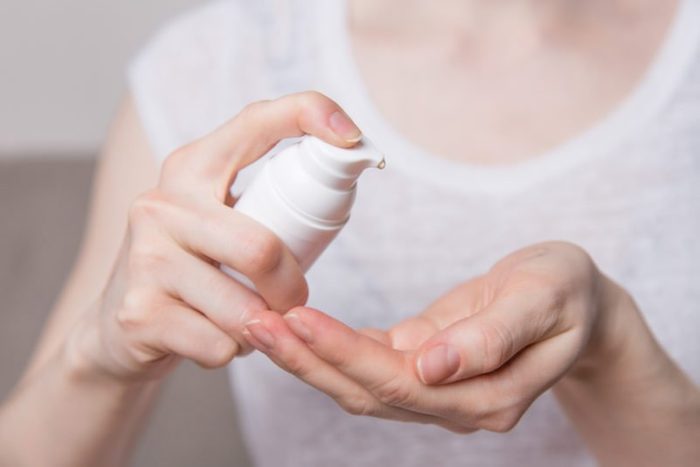
You let products build-up
If you don’t adequately scrub off face products or makeup, or you don’t rinse your cleanser off thoroughly, your skin could get irritated and break out, Dr. Lee says. “If you’re using a foaming cleanser, rub long enough to get foam to cover and lather throughout your face,” she says. “If it’s a cream, rub enough to spread a thin layer over your whole face.”
Next: Check out our decade-by-decade guide to changing up your skin-care routine.
